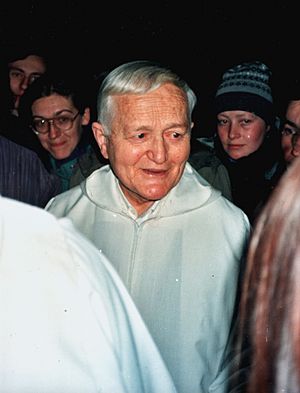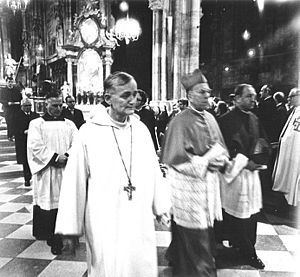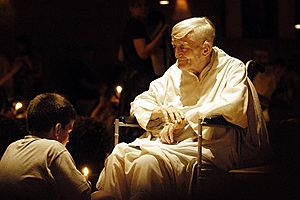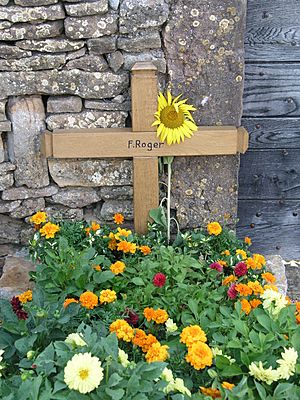Brother Roger facts for kids
Quick facts for kids Brother Roger Schutz |
|
|---|---|
| Prior of Taizé | |

Brother Roger Schutz in 1991
|
|
| Enthroned | 1940 |
| Reign ended | 2005 |
| Successor | Brother Alois |
| Personal details | |
| Birth name | Roger Louis Schutz-Marsauche |
| Born | 12 May 1915 Provence, Vaud, Switzerland |
| Died | 16 August 2005 (aged 90) Taizé, Saône-et-Loire, France |
| Nationality | Swiss |
| Denomination | Reformed Christianity |
| Education | Reformed theology |
| Alma mater | University of Strasbourg University of Lausanne |
Roger Schutz (born May 12, 1915 – died August 16, 2005) was a Swiss Christian leader. He was also known as Brother Roger (French: Frère Roger). In 1940, Brother Roger started the Taizé Community. This is a special Christian community in Burgundy, France. It brings together people from different Christian backgrounds. He was its first leader, called a prior, until he passed away in 2005. Towards the end of his life, the Taizé Community became very well known around the world. Thousands of young people visit it every week, and this continues even after his death.
Contents
About His Life
Early Years
Roger Schutz was born on May 12, 1915, in Provence, Switzerland. He was the youngest of nine children. His father, Karl Ulrich Schutz, was a Protestant pastor from Switzerland. His mother, Amélie Henriette Marsauche, was a Huguenot from Burgundy, France.
From 1937 to 1940, Roger studied Reformed theology. He went to universities in Strasbourg and Lausanne. During this time, he was a leader in the Swiss Student Christian Movement. This group was part of a larger worldwide student Christian organization. After he became ill with tuberculosis, he started thinking about living a monastic life. This means living a simple life dedicated to God, often in a community.
Starting the Taizé Community
In 1940, World War II began. Roger felt called to help people who were suffering because of the war. His grandmother had done similar work during World War I. He rode his bicycle from Geneva to Taizé. This is a small town in France. Taizé was in a part of France that was not occupied by German troops at the time.
He bought an empty house there. For two years, he and his sister, Genevieve, secretly helped refugees. These refugees included both Christians and Jewish people. They had to leave Taizé when they learned that the Gestapo (German secret police) knew about their activities. In 1944, he returned to Taizé. He then started the Community. It was a small group of men who lived together. They lived simply, shared what they had, and were open to all Christians.
Since the late 1950s, many thousands of young adults have visited Taizé. They come from many different countries. They take part in weekly meetings for prayer and reflection. Also, brothers from Taizé travel to lead meetings in Africa, North and South America, Asia, and Europe. They call this a "pilgrimage of trust on earth."
Brother Roger was a humble leader. He rarely gave interviews. He did not want people to focus too much on him. He wrote many books about prayer and faith. He encouraged young people to trust in God. He also asked them to be active in their local church and to help others. He even wrote some books with Mother Teresa, who was a good friend of his.
His Passing
On August 16, 2005, Brother Roger passed away unexpectedly. He was in the church at Taizé during an evening prayer. A person attacked him, and he died soon after. The person who attacked him was immediately caught by others in the church.
His funeral was held on August 23, 2005. Important people attended, like the President of Germany and a French minister. Thousands of people gathered at Taizé for the service. Many watched on a large screen outside the church. Brother Roger's simple wooden coffin was carried into the church by members of his community. A Catholic cardinal, Walter Kasper, led the service. This was very unusual because Brother Roger was Protestant. Cardinal Kasper said that Brother Roger helped bring Christians closer together. He also mentioned that Brother Roger cared deeply about fairness for everyone. Brother Alois Löser, who would become Brother Roger's successor, prayed for forgiveness for the attacker.
Working for Christian Unity

All his life, Brother Roger worked to bring different Christian denominations closer. This effort is called ecumenism. He especially reached out to Christian youth. He did not like formal speeches. Instead, he encouraged people to explore their faith together through silence and prayer.
In 1995, he spoke to over 100,000 young people in Paris. He told them, "We have come here to search, or to go on searching through silence and prayer, to get in touch with our inner life. Christ always said, 'Do not worry, give yourself.'"
His Faith Journey
Brother Roger came from a Reformed faith (Protestant) background. However, he also took part in the Catholic communion during Mass. He even received communion from Pope John Paul II and Pope Benedict XVI. This showed his strong desire for unity among all Christians.
He believed in a gradual way of bringing Christian faiths together. He wanted to build bridges between different traditions. His life showed a deep commitment to Christian unity.
His Successor
In 1998, Brother Roger chose Brother Alois to be the next leader of Taizé. Brother Alois is a German Catholic. He first came to Taizé as a young person and later joined the community. In January 2005, it was announced that Brother Alois would soon take over. However, Brother Roger passed away before this happened. Brother Alois was installed as the new Prior shortly after Brother Roger's death.
Awards and Honors
Brother Roger received many awards for his work for peace and unity:
- John Templeton Foundation: Templeton Prize (1974)
- Börsenverein des Deutschen Buchhandels: Friedenspreis des Deutschen Buchhandels (1974)
- University of Warsaw: Honorary doctorate (1986)
- UNESCO: UNESCO Prize for Peace Education (1988)
- City of Aachen: Charlemagne Prize (1989)
- Catholic University of Leuven: Honorary doctorate (1990)
- Alfred Toepfer Stiftung: Robert Schuman Prize (1992)
- Notre Dame University: Notre Dame Award (1996)
- Saint John’s University: Dignitas Humana Award (2003)
- Archbishop Rowan Williams: Lambeth Cross for Ecumenism (2004)
See also
 In Spanish: Roger Schutz para niños
In Spanish: Roger Schutz para niños
 | Bessie Coleman |
 | Spann Watson |
 | Jill E. Brown |
 | Sherman W. White |



